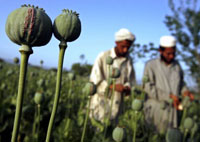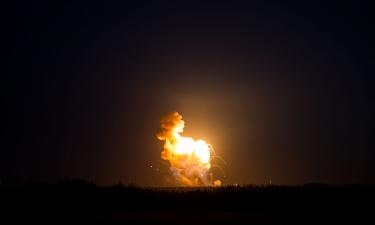USA ready to lose more men in Afghanistan for the sake of opium drugs
Barack Obama was running his pre-election campaign as a tough critic of the unpopular and cost-intensive war in Iraq. He acknowledged the need to end the US-led campaign in Iraq and proclaimed Afghanistan to be the central front of the anti-terrorist struggle.

NATO and the USA have lost the control over the biggest part of the country’s territory. Taliban and al-Qaeda continue to intensify their activities in the north-west of Pakistan.
Resistance has been gathering pace in Afghanistan, while the coalition troops have been suffering from the shortage of personnel. A recent report from the US Defense Department can only prove that. The situation is especially alarming in the south of the country, where the concentration of resources in not good enough to maintain the security regime. The number of USA’s daily losses in Afghanistan is a lot higher than in Iraq.
The Talibs concentrate their forces on the Gindukush mountain chain and threaten to encircle Kabul. Apparently, the current strategy of the United States in Afghanistan does not contribute to diminishing Taliban’s influence. Taliban enjoys a constant presence on 72 percent of Afghanistan’s territory, whereas in 2007 it was present on 54 percent of the country’s territory. The foreign contingent can presently use only one of the four highways from Kabul for safety reasons.
The USA needs to choose between Iraq and Afghanistan . Indeed, the achievements of the military and political stability in Iraq does not seem to be possible, taking into consideration the intention of the new administration of the United States to end the war there. The USA intends to send three military brigades to Afghanistan in 2009 instead.
The US contingent in the USA will grow from 36 to 60 thousand military men during the current year. Not less than 80,000 more servicemen will be required to suppress the Taliban movement. Defense Secretary Roberts Gates stated in December 2008 that the USA would reinforce the ISAF units (NATO’s International Security Assistance Force). Gates insisted on an increase of up to 70,000 servicemen. The extra troops will be sent to Afghanistan for one or two years, Gates said.
The increase of the US military group in Afghanistan is not likely to give the United States and its allies an opportunity to retrieve the initiative. Most of NATO countries refuse to enlarge their contingents and take active parts in combat operations. Furthermore, the US and NATO troops suffer from insufficient supplies in Afghanistan: Talibs and their Pakistani allies attack communication lines on a regular basis.
NATO is thus forced to use other routes of transportation via Central Asia . It could be possible to access the northern route via Georgia, Azerbaijan or Russia. The first option stipulates an increase of the military presence of the West in the Caucasus, including the expansion of NATO. The second variant requires an agreement with Russia, which excludes the possibility to grant the NATO membership to Ukraine and Georgia. The USA will also have to withdraw its troops from Iraq too. There is no such a plan in the United States, which means that many other lives will be taken.
The pullout from Iraq amid ongoing military operations is quite a complicated goal to achieve. About 15 combat arms groups, combat service support units, tens of thousands of units of weapons and hundreds of thousands of military cargoes will have to be withdrawn via Kuwait on a limited number of roads. Considerable amounts of weaponry and other equipment will have to be abandoned in Iraq .
The US victory in Afghanistan is just a phantom, and Washington is perfectly aware of that. Nevertheless, the US administration caught a strong hold of this country for some reason. Many experts say that the USA does not intend to pull out from the war-torn country because of its drugs. Afghanistan produces 93 percent of all opium drugs. About 8,200 tons of opium drugs were exported from the country in 2007, which doubled the results of 2005. Several officials of the US administration supposedly maintain contacts with Afghan drug dealers. Afghanistan is a very big pork barrel: military losses are fully compensated with drug business revenues.
Vladimir Anokhin
Subscribe to Pravda.Ru Telegram channel, Facebook, RSS!





